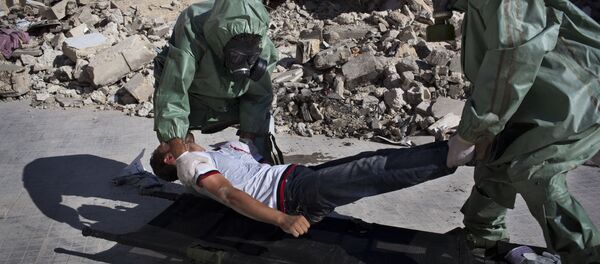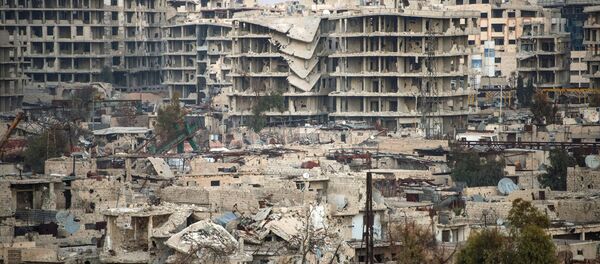DAMASCUS (Sputnik) — The Syrian authorities categorically deny accusations by the Human Rights Watch (HRW) over alleged use of chemical weapons by the Syrian army during the liberation of the city of Aleppo, the Syrian Foreign Ministry said Wednesday.
"The Syrian government denies all false accusations contained in a HRW report which claims that the Syrian army and its allies have used toxic substances during the liberation of Aleppo," the ministry said in a statement.
HRW said in a report presented at the United Nations on Monday that, based on data from in-person interviews with witnesses as well as video footages and photographs, it concluded that government helicopters dropped chlorine in the residential areas of Aleppo at least eight times in the period between November 17 and December 13, 2016.
So far, there has been a number of reports on use of chemical weapons in Syria, putting responsibility for attacks both on Syrian authorities and Islamic State (IS, banned in Russia) terrorist group.
Despite lack of conclusive evidence, a number of countries, in particular the United Kingdom, France, and the United States, blamed the Syrian government for the chemical attacks. Syrian President Bashar Assad though denied all accusations, claiming the reports failed to provide conclusive evidence of its culpability and putting blame on the terrorist groups. The Russian authorities have repeatedly called on necessity to double-check such kind of reports, stressing that conclusions cannot be simply made on interviews of several local residents.
In late October-early November 2016, a number of chemical attacks were conducted in Syria's city of Aleppo by militants, killing dozens of Syrian servicemen and civilians. The Syrian government urged the Organization for the Prohibition of Chemical Weapons (OPCW) to conduct the investigation, while the Russian Defense Ministry handed the results of the chemical use probe to Syria’s national regulator in charge of implementing the OPCW convention.
Syria's civil war between government forces and a wide range of insurgents, including opposition groups and terrorists, such as al-Nusra Front and Daesh, both outlawed in Russia, has raged for some five years and has claimed hundreds of thousands of lives. Aleppo, fought over since 2012, was liberated and fully retaken by the government in late December.







